Want to learn full stack development? Here’s a quick guide to the best online platforms offering practical, beginner-friendly, and advanced resources to master both front-end and back-end technologies:
- freeCodeCamp: Free, project-based curriculum with certifications and a supportive community.
- Codecademy: Interactive lessons with hands-on coding exercises and career-focused projects.
- Scrimba: Unique interactive video lessons where you can edit code directly in the player.
- Udemy: Affordable, self-paced courses with lifetime access and comprehensive content.
- The Odin Project: Free, project-driven learning paths focusing on real-world applications.
- IBM Full Stack Cloud Developer: Cloud-focused, industry-recognized program with hands-on labs.
- Scaler Academy: Mentorship-driven program with career placement support.
- KodNest: Job-oriented training with mock interviews and placement support.
- LinkedIn Learning: Structured video-based courses with certificates shareable on LinkedIn.
- MDN Web Docs: Trusted technical reference for solving specific coding challenges.
Quick Comparison
| Platform | Cost | Key Features | Best For |
|---|---|---|---|
| freeCodeCamp | Free | Project-based learning, certifications | Beginners, self-paced learners |
| Codecademy | $19.99/month | Interactive lessons, career paths | Hands-on learners |
| Scrimba | $19/month | Interactive video lessons | Visual learners |
| Udemy | $10-$15/course | Lifetime access, structured courses | Budget-friendly learners |
| The Odin Project | Free | Real-world projects, community support | Project-focused learners |
| IBM Full Stack Cloud | $39-$79/month | Cloud integration, industry credentials | Cloud-focused professionals |
| Scaler Academy | ₹26,999+ | Mentorship, job placement | Career-oriented learners |
| KodNest | ₹26,999+ | Job prep, mock interviews | Immediate job seekers |
| LinkedIn Learning | $29.99/month | Certificates, LinkedIn integration | Career switchers |
| MDN Web Docs | Free | Comprehensive technical documentation | Advanced developers |
Start with free platforms like freeCodeCamp or The Odin Project to explore coding basics. For structured, career-focused paths, consider Scaler Academy, IBM, or LinkedIn Learning. Choose based on your goals, budget, and learning style.
The Complete Web Development Roadmap [2024]
1. Codecademy: Learn by Doing
Codecademy is an interactive platform designed to teach full stack development through practical coding exercises. With instant feedback and a browser-based learning setup, it’s perfect for those who learn best by doing.
The curriculum starts with the basics of HTML, CSS, and JavaScript, then moves into advanced topics like React and Node.js. Each lesson builds on the last, helping learners develop a strong grasp of both front-end and back-end technologies.
One standout feature of Codecademy is its built-in development environment (IDE). Learners can write and test code directly in their browsers, skipping the hassle of setting up software. For $19.99/month, the Pro version adds career resources, interactive projects to build portfolios, structured skill paths, and access to a peer community.
With project-based learning, students create everything from simple web pages to full-stack applications. These projects don’t just teach – they also serve as proof of skills for potential employers.
Codecademy stays up-to-date by working with industry partners and regularly refreshing its curriculum. This ensures it aligns with the growing demand for web developers, projected to rise by 13% by 2030 [3]. Its mix of guided lessons, hands-on practice, and community support makes it a strong choice for those looking to break into coding.
For a more open-ended and community-driven path to full stack development, freeCodeCamp offers an alternative approach.
2. freeCodeCamp: Free and Open Learning
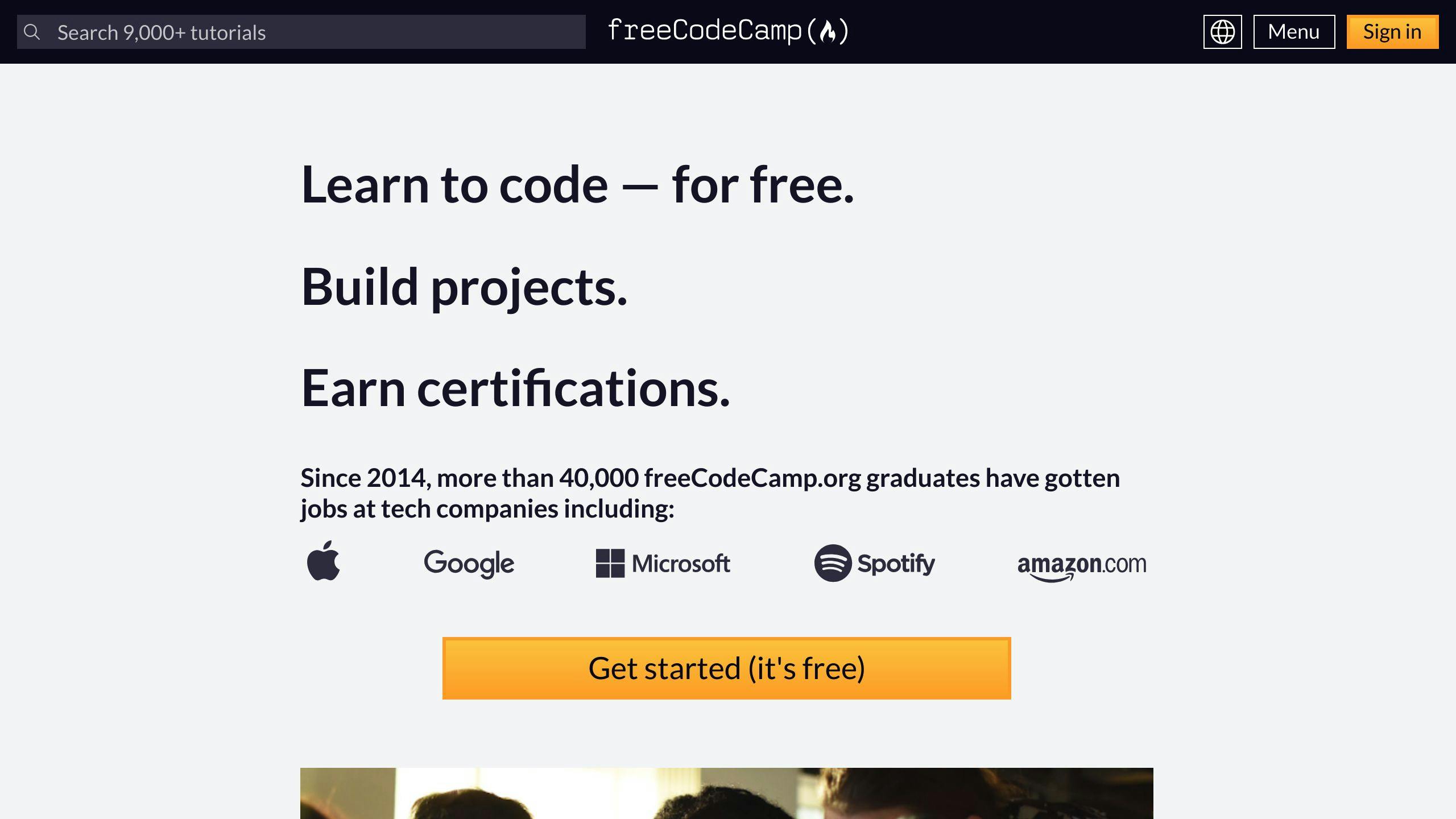
Launched in 2014, freeCodeCamp is a donation-driven platform designed to help aspiring full stack developers learn at no cost. It offers a well-structured curriculum that takes learners from the basics of HTML and CSS to advanced topics like JavaScript, React, Node.js, and SQL. Along the way, students work on hands-on projects that lead to certifications, all while building a portfolio of work.
These certifications are project-based and focus on teaching practical, job-ready skills. Projects range from creating responsive web pages to building interactive applications and full-stack solutions with database integration. Not only do these projects teach crucial skills, but they also double as portfolio pieces that can impress potential employers.
freeCodeCamp’s success is evident in its results – more than 40,000 graduates have landed developer roles [2]. This achievement is tied to its detailed curriculum and the supportive community that surrounds it.
| Certification Track | Required Projects |
|---|---|
| Front End Development (HTML, CSS, JavaScript, React) | 5 |
| Back End Development (Node.js, Express, MongoDB) | 5 |
| Full Stack (APIs, Database Management, Security) | 10 |
The platform also features an active forum where learners can collaborate and network, while local meetups help bring this sense of community into the real world. The curriculum is regularly updated based on feedback from learners and industry experts, keeping it aligned with current job market demands.
After mastering the basics with freeCodeCamp, you can take your skills further with platforms like Scrimba, which offers interactive video lessons to enhance your learning experience.
3. Scrimba: Interactive Video Lessons
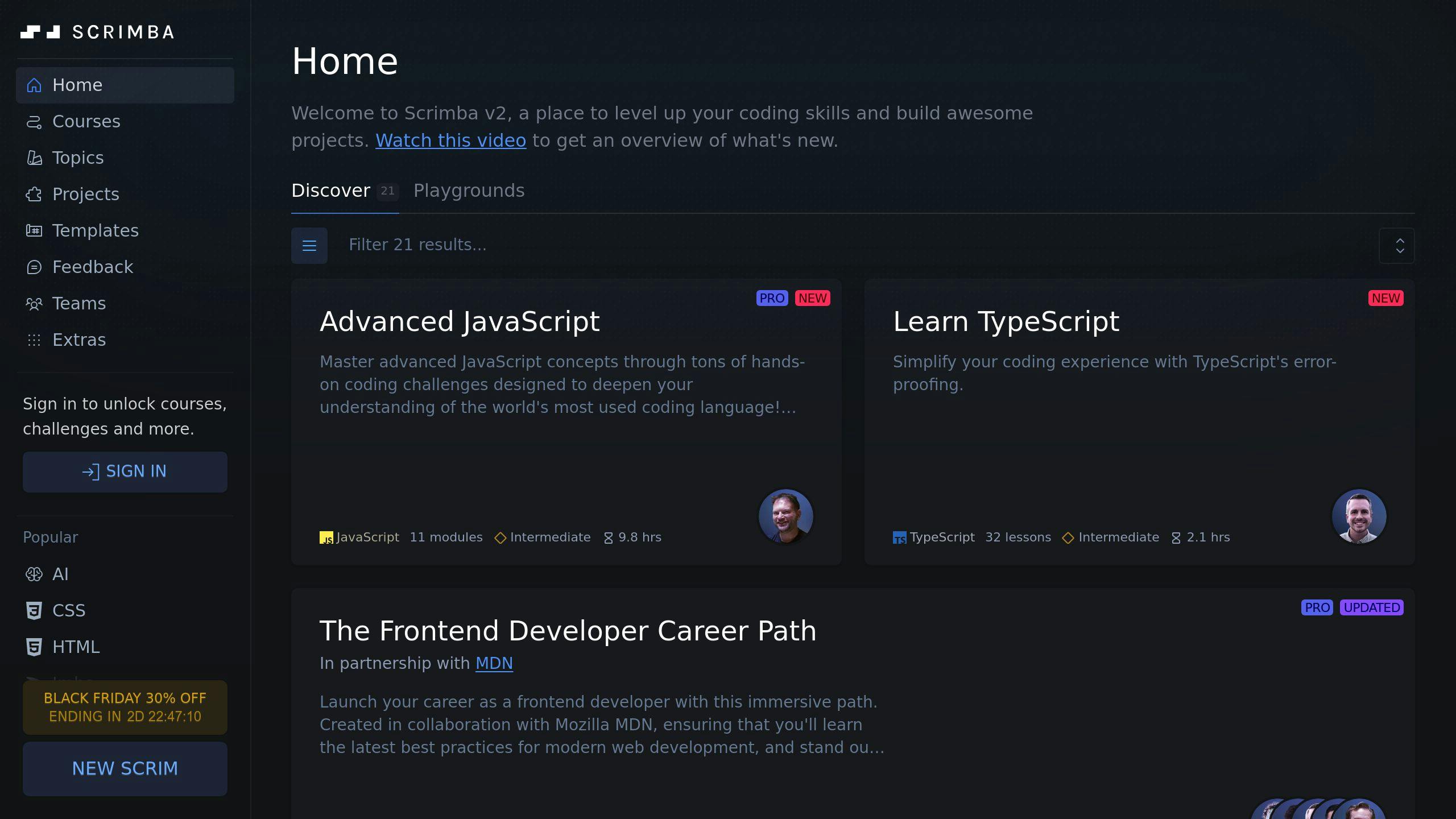
Scrimba, launched in 2017, takes a hands-on approach to coding education. Its standout feature? You can pause lessons and edit code directly within the video player. This combination of theory and practice helps learners grasp concepts more effectively.
Scrimba offers a well-rounded curriculum covering full stack technologies. Courses range from basic HTML, CSS, and JavaScript to advanced topics like Node.js, Express, and MongoDB. Thanks to its unique playback technology, every lesson feels like a live coding session.
| Feature | What It Offers |
|---|---|
| Live Code Editor | Edit code and see instant results |
| Community Forum | Connect with instructors and peers |
The Pro subscription costs $19 per month (billed annually) or $25 monthly and unlocks additional features to deepen the learning experience. Scrimba also provides free content, allowing users to explore the platform before committing to a paid plan.
What sets Scrimba apart is its interactive style. Instead of passively watching tutorials, learners actively work with the code – making mistakes, fixing them, and learning in real-time. This approach helps build a strong understanding of full stack development.
Unlike freeCodeCamp, which focuses on project certifications, Scrimba emphasizes applying skills immediately. The curriculum is regularly updated to align with industry trends, ensuring students are equipped with current, job-ready knowledge. With over one million users, Scrimba has become a popular choice for full stack development.
For those looking for a more structured, bootcamp-like experience, platforms like Udemy also offer full stack development courses.
4. Udemy‘s The Complete 2024 Web Development Bootcamp
Udemy’s The Complete 2024 Web Development Bootcamp is a budget-friendly, comprehensive course designed for those who want a structured, self-paced path to learning full stack development. It includes 65 hours of video lessons, 135+ articles, 49 downloadable resources, and 8 coding exercises. Topics range from the basics to advanced concepts like React, Node.js, and databases [1].
| Course Component | Details |
|---|---|
| Video Content | 65 hours of in-depth lessons |
| Additional Resources | 135+ articles, 49 downloadable files |
| Hands-On Practice | 8 coding exercises, project work |
The course emphasizes practical skills through projects like creating responsive websites, interactive apps, and database-driven solutions. These hands-on tasks not only help you grasp key concepts but also allow you to build a portfolio. Compared to freeCodeCamp’s free certifications or Scrimba’s interactive lessons, Udemy offers a more structured curriculum with lifetime access, all at an affordable price [1][2].
Regular updates keep the course aligned with current industry trends and technologies, ensuring learners gain skills that are relevant in today’s job market. The lifetime access feature means you can revisit the material anytime, letting you learn at your own pace [1].
The course also includes a community forum where you can ask questions, share experiences, and collaborate with other learners. It’s beginner-friendly too, requiring no prior programming experience, which makes it a great entry point for anyone looking to start their development journey [1].
For those seeking a more career-oriented program, you might want to explore IBM’s Full Stack Cloud Developer course, which combines technical training with practical, real-world projects.
5. MDN Web Docs: Trusted Developer Resources
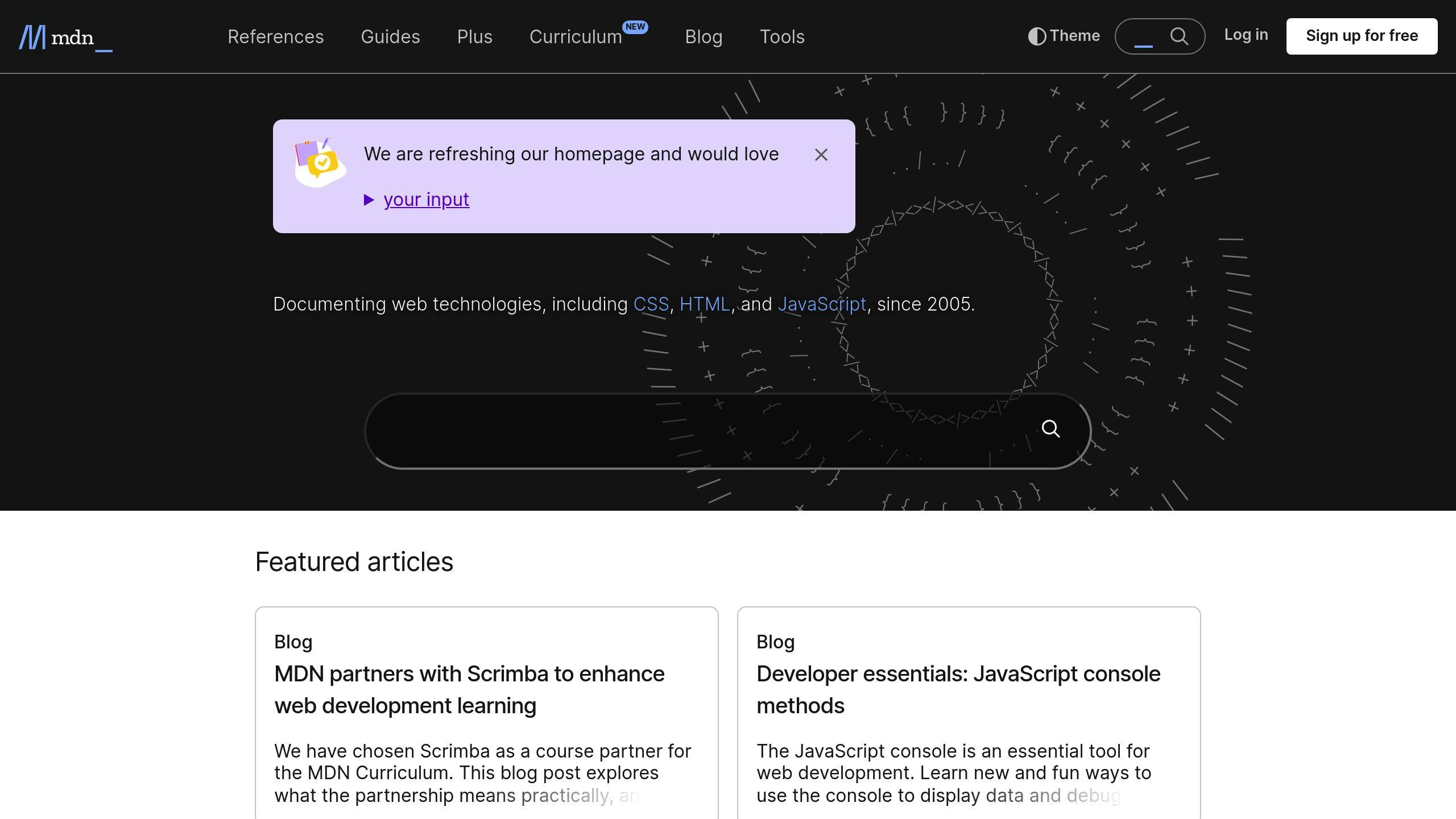
MDN Web Docs stands out as a rich source of technical information for developers looking to deepen their understanding or solve specific coding challenges. Created by Mozilla, this platform offers detailed resources for full stack developers, covering everything from basic HTML to advanced JavaScript techniques.
MDN Web Docs is structured into three main learning paths:
| Learning Path | Content Focus | Key Features |
|---|---|---|
| Frontend Fundamentals | HTML, CSS, JavaScript basics | Interactive examples, browser compatibility guides |
| Backend Development | Node.js, APIs, databases | Tutorials on server-side programming, security best practices |
| Web APIs | DOM manipulation, fetch API, WebSocket | Implementation examples, debugging tips |
The documentation is continuously updated by Mozilla and contributors worldwide to reflect the latest web standards and practices. One of its standout features is the inclusion of interactive examples, such as live coding environments in the JavaScript section. These allow users to experiment with concepts like DOM manipulation, event handling, and asynchronous operations directly in their browsers.
MDN Web Docs isn’t a structured course platform but rather a reliable reference for tackling specific technical issues. For example, its browser compatibility tables clearly outline which features are supported across different browsers – a critical tool for developers building cross-platform applications.
Beginners can start with the "Getting Started with the Web" guide, which offers a step-by-step introduction to web development. More experienced developers can dive into advanced topics like Web Components, Progressive Web Apps, WebAssembly, and security best practices.
The platform’s clear, straightforward explanations make it easier to grasp complex ideas, catering to developers at all skill levels. With its mix of detailed documentation and hands-on examples, MDN Web Docs is an indispensable tool for full stack developers.
For those who prefer a more project-oriented learning approach, The Odin Project provides another excellent option.
6. The Odin Project: Full Stack Curriculum
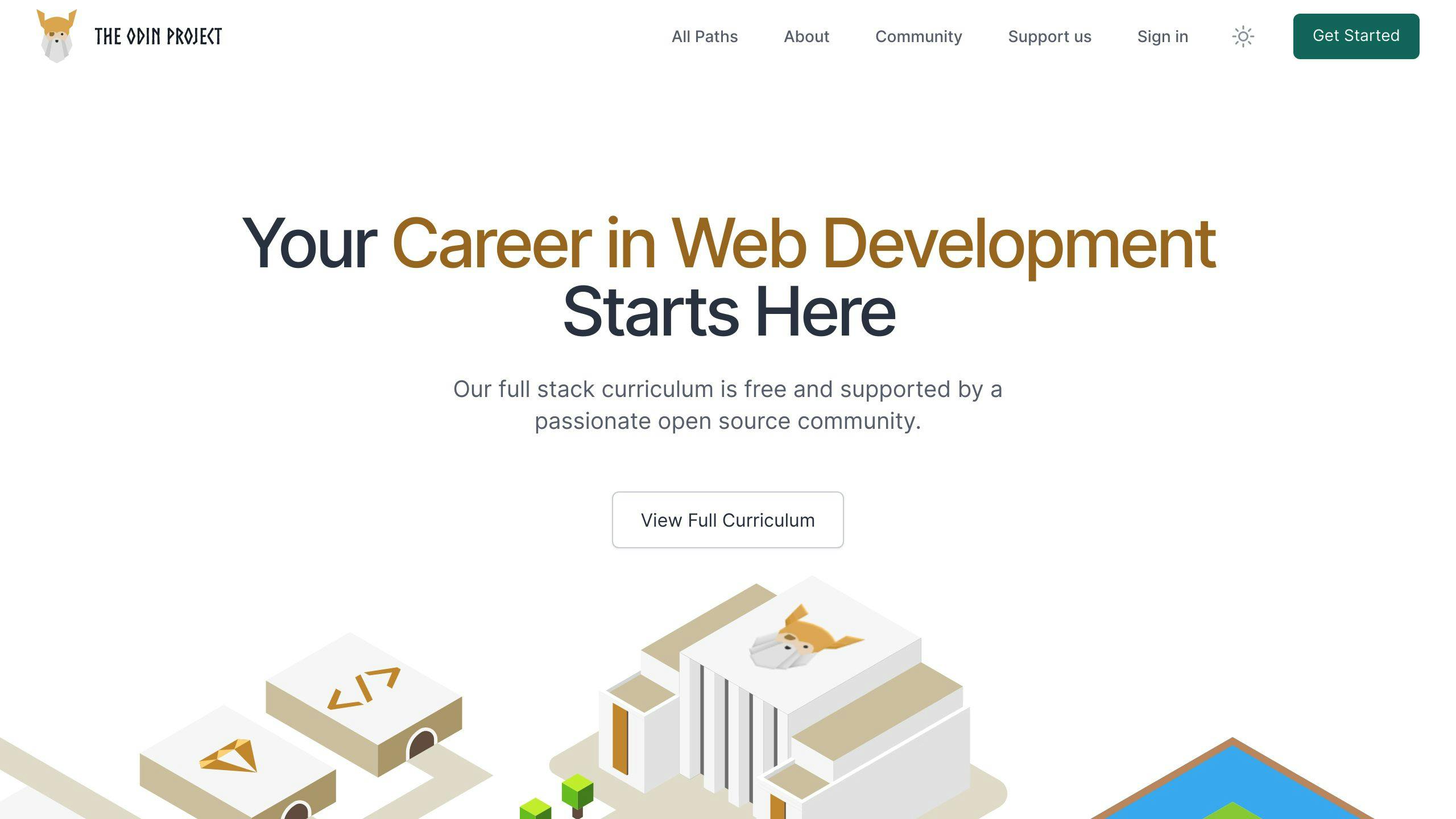
The Odin Project is a free, open-source platform that helps learners gain practical full-stack development skills through project-based learning. With over 100,000 users worldwide, it’s designed to turn theoretical knowledge into hands-on expertise.
What sets The Odin Project apart from platforms like freeCodeCamp or Scrimba is its focus on real-world projects rather than certifications or interactive lessons. The curriculum is divided into structured learning paths:
| Learning Path | Core Focus | Key Projects |
|---|---|---|
| Foundations | HTML, CSS, Git, Command Line | Landing Pages, Basic Web Apps |
| Full Stack JavaScript | Node.js, React, MongoDB | Interactive Applications |
| Ruby on Rails | Ruby, Rails, SQL | Web Platforms |
The program starts with foundational topics like Git and command-line tools, then moves into full-stack projects such as building interactive applications and integrating databases. This step-by-step approach ensures learners build practical, job-ready skills.
A strong feature of The Odin Project is its active Discord community, where learners collaborate, share solutions, and get feedback – mimicking real-world teamwork. The curriculum is regularly updated to include modern tools and frameworks, keeping it aligned with industry trends.
Each module builds on the last, taking students from basics to advanced projects. The self-paced format allows flexibility, but success requires dedication to completing projects and engaging with the community.
While The Odin Project offers a free, community-driven learning experience, IBM’s Full Stack Cloud Developer program provides a more structured, industry-recognized alternative, which we’ll discuss next.
sbb-itb-f454395
7. IBM Full Stack Cloud Developer: Industry-Focused Training
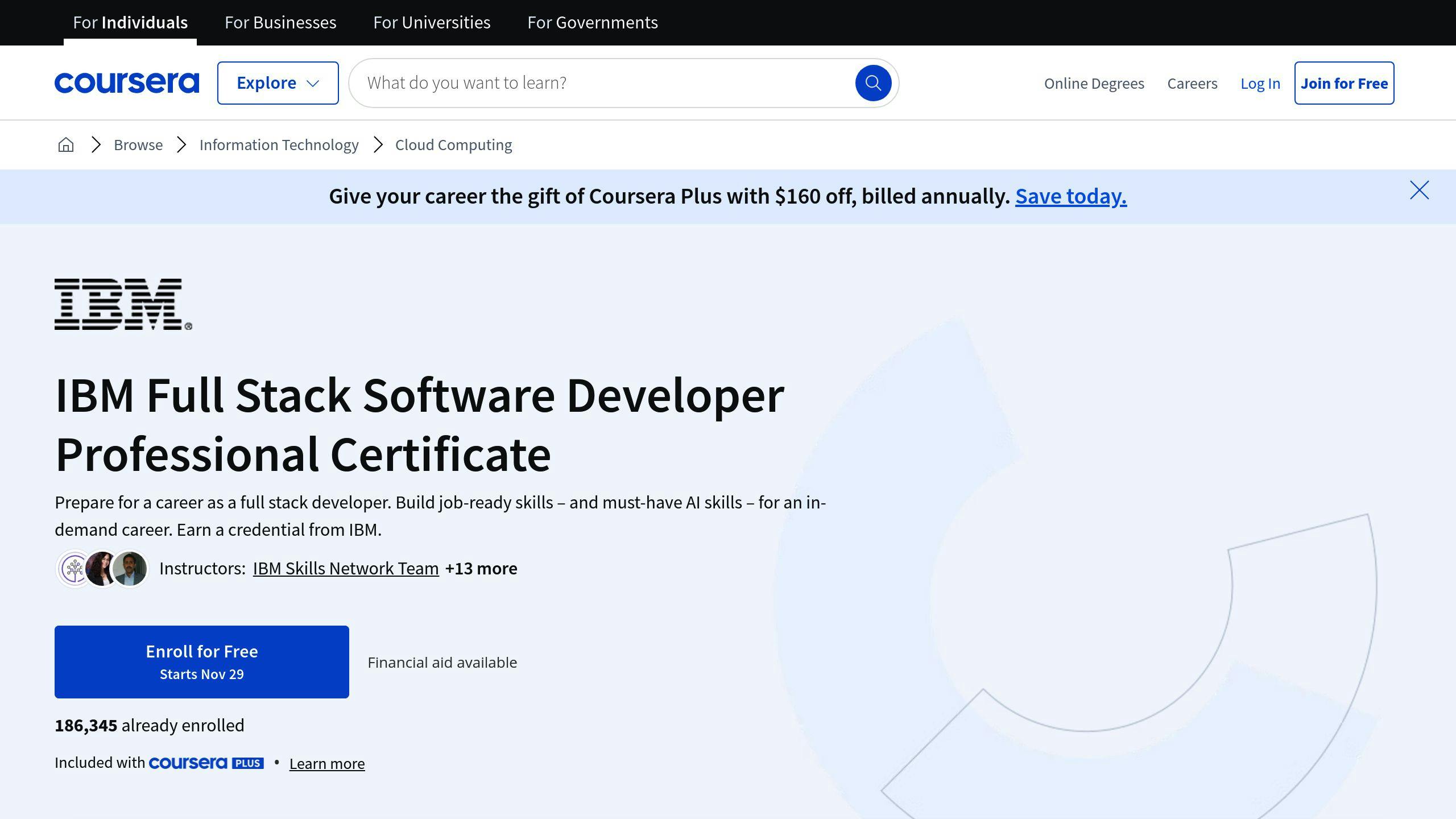
For those looking to specialize in full stack development with a focus on cloud integration, IBM’s Full Stack Cloud Developer program on Coursera is a solid option. With a 4.6-star rating from over 5,600 learners [4], it has proven to be a reliable choice for building in-demand skills.
This program combines essential and advanced topics with hands-on practice:
| Learning Phase | Technologies Covered | Skills Developed |
|---|---|---|
| Front-End | HTML, CSS, JavaScript | Building Responsive Interfaces |
| Back-End | Node.js, Express.js | Server-Side Development |
| Cloud and Database | IBM Cloud, Docker, Kubernetes, SQL, NoSQL | Deployment, Scaling, and Data Management |
What sets this program apart is its integration of cloud technologies at every step. Students gain practical experience using IBM Cloud services, learning how to deploy and manage applications in real-world environments.
The program, which can be completed in 3 to 6 months, is well-suited for those upgrading their skills or transitioning careers. Its focus on cloud deployment and scaling makes it stand out from similar offerings, especially for enterprise-level development.
IBM’s certification is highly regarded due to its alignment with current industry needs, particularly in cloud computing and containerization. The curriculum evolves with market trends, ensuring learners stay competitive.
Support resources include instructor assistance, peer communities, and interactive coding tools, making the learning process more engaging and effective.
While IBM emphasizes cloud integration and enterprise-grade training, Scaler Academy takes a different route with its job-focused full stack development program aimed at career placement.
8. Scaler Academy‘s Full Stack Developer Program
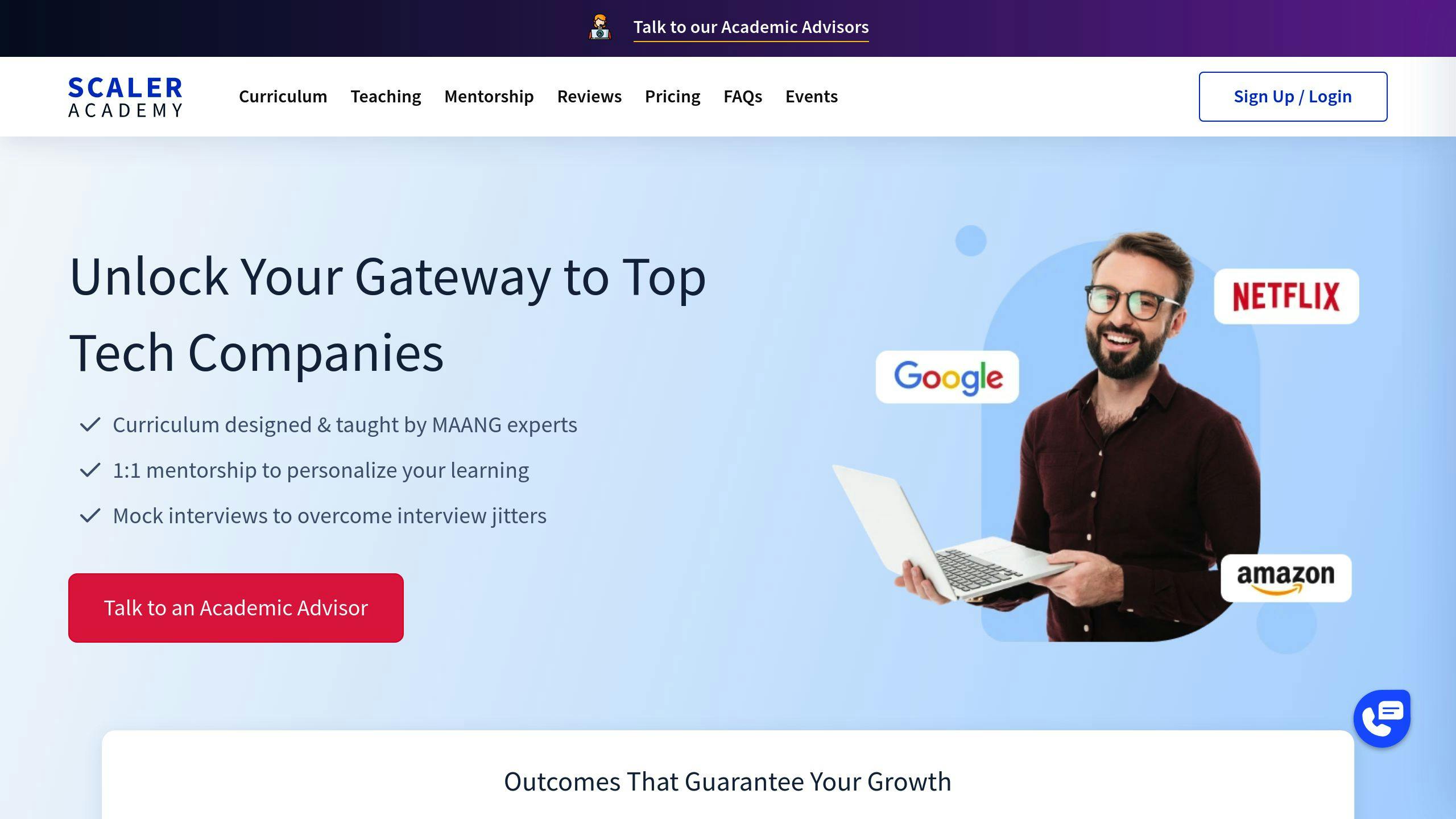
Scaler Academy provides an intensive full stack development program aimed at equipping aspiring developers with practical skills and industry insights. Running for 30-44 weeks, the program is tailored to accommodate varying skill levels, from beginners to advanced learners, with a curriculum designed to build expertise step by step.
A standout feature of this program is its 1:1 mentorship. Students receive personalized guidance from seasoned industry professionals, helping them grow both technically and professionally. This mentorship bridges the gap between theoretical learning and practical application.
Here’s what the program includes:
- Live coding sessions that encourage interactive learning
- Regular assignments to solidify concepts
- Industry-relevant projects that mimic real-world challenges
- A thorough focus on both front-end and back-end technologies
What sets Scaler apart is its emphasis on hands-on learning. Students tackle projects that reflect actual development problems, giving them the confidence and skills to handle professional scenarios.
The program’s success is evident in its outcomes – many graduates land roles at top tech companies. Scaler enhances this journey with career services like mock interviews, profile refinement, and job placement support.
While Scaler Academy emphasizes mentorship and long-term career growth, KodNest takes a more direct, job-oriented approach for those seeking immediate employment opportunities.
9. KodNest: Job-Oriented Training
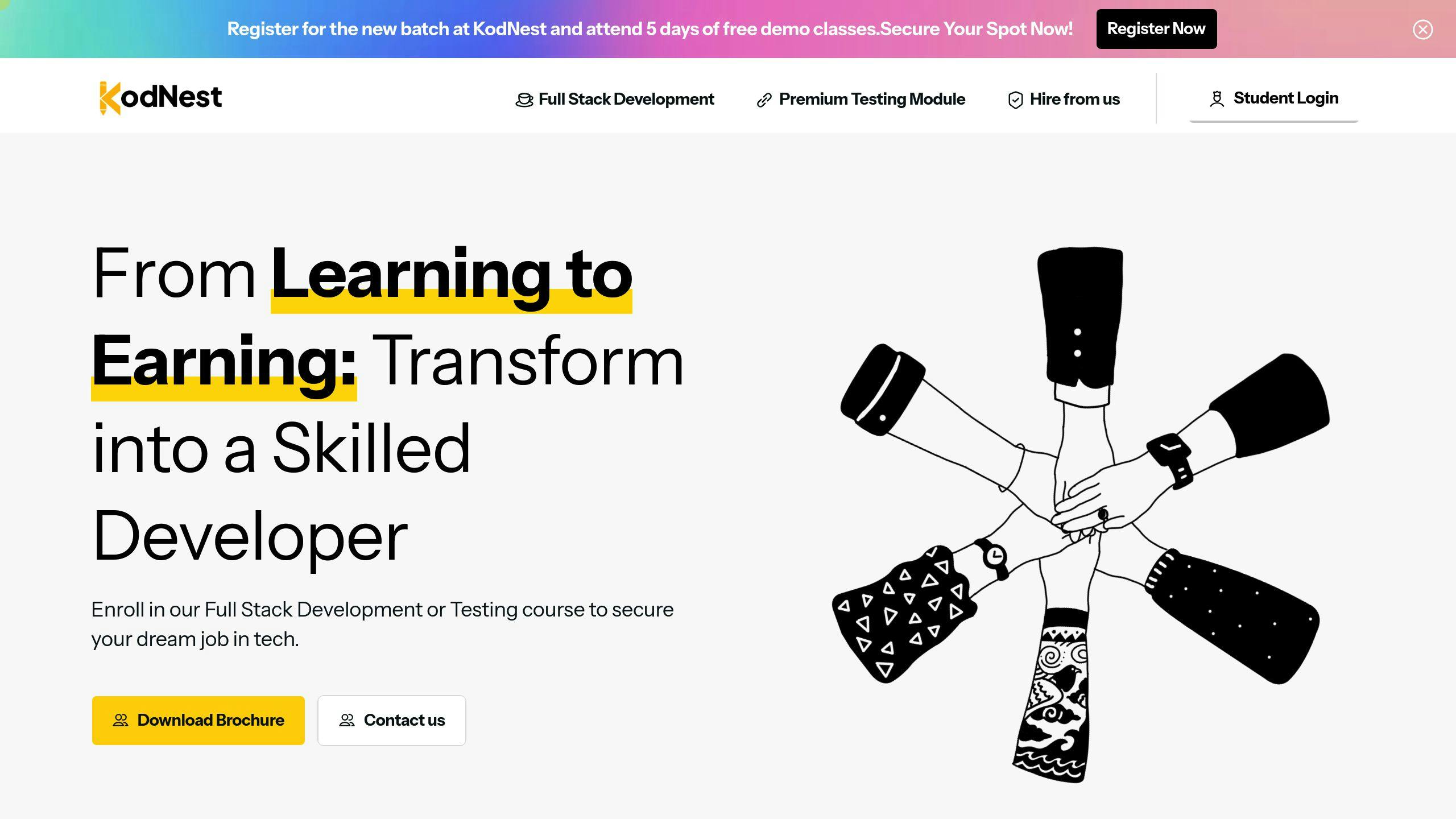
KodNest focuses heavily on preparing learners for employment in full-stack development, using AI-driven tools to provide personalized mentorship. This approach ensures learners receive feedback tailored to their progress, helping them build the skills needed for the tech industry.
The program emphasizes hands-on learning with features like:
- Interactive coding projects that simulate real-world challenges
- Training in Java, Python, and front-end development
- Database management skills
- Soft skills training to excel in professional environments
KodNest’s standout feature is its robust career support system:
| Career Support Feature | Description |
|---|---|
| Mock Interviews | Practice sessions with industry-standard questions |
| Hackathons | Collaborative coding events to enhance portfolios |
| Placement Support | Access to job opportunities and employer networks |
| Career Guidance | One-on-one mentoring for career advancement |
The program is available online for ₹26,999 and offline for ₹31,999, with flexible payment options provided. Through industry-relevant projects and continuous mentor guidance, KodNest bridges the gap between learning and real-world application, making it a top choice for those looking to secure tech jobs quickly.
If you’re looking to expand your skillset further, LinkedIn Learning also offers a structured path to becoming a full-stack web developer.
10. LinkedIn Learning’s Become a Full-Stack Web Developer
LinkedIn Learning provides a well-structured, video-based curriculum designed for those looking to build full-stack development skills. It’s especially helpful for professionals shifting into development roles, combining video lessons with hands-on exercises to build practical expertise.
The program is broken down into key areas of development, progressing from beginner to advanced topics:
| Technology Stack | Course Level | Skills Covered |
|---|---|---|
| Front-end | Beginner | HTML, CSS, JavaScript basics |
| Front-end | Intermediate | React, responsive design |
| Back-end | Intermediate | Node.js, Express.js |
| Database | Advanced | SQL, database management |
One standout feature is how completed course certificates can be directly added to LinkedIn profiles. This boosts visibility to employers, which is crucial given that 87% of recruiters use LinkedIn to find tech talent.
For a subscription cost of $29.99/month, users get unlimited access to:
- Video tutorials paired with exercise files
- Hands-on coding practice environments
- Tools to monitor progress
- Community forums for networking and peer support
Courses are frequently updated to include the latest technologies and trends, keeping learners up to date. With a commitment of 8-10 hours per week, learners can develop full-stack skills in about 6-8 months, depending on their starting point.
The platform emphasizes practical learning through features like:
- Comprehensive course transcripts
- Tailored learning paths
- Progress tracking tools
- Interactive coding exercises
Comparison of Learning Platforms
Choosing the right platform can feel overwhelming, especially with so many options tailored to full stack developers. Here’s a breakdown to help you weigh your options across key factors like pricing, features, and career support.
| Platform | Pricing | Interactive Features | Career Support | Certification Value |
|---|---|---|---|---|
| freeCodeCamp | Free | Project-based learning, coding challenges | Community forums, job board | Verified certificates for completed tracks |
| Codecademy | Free tier + Premium ($39.99/month) | Interactive code editor, immediate feedback | Career paths, portfolio projects | Course completion certificates |
| LinkedIn Learning | $29.99/month | Practice environments, exercise files | Direct LinkedIn profile integration | Certificates shareable on LinkedIn |
| Udemy | $10-15 (during sales) | Downloadable resources, coding exercises | Instructor Q&A | Course completion certificate |
| IBM Full Stack Cloud Developer | $39-79/month | Hands-on labs, cloud sandbox | Industry-recognized credentials | IBM digital badge |
Each platform has its own strengths. freeCodeCamp and The Odin Project are ideal for learners who want structured, project-based paths covering both front-end and back-end technologies. For visual learners, Scrimba offers interactive coding videos, which can feel more engaging compared to freeCodeCamp’s text-based approach. Similarly, Codecademy provides immediate practice through its browser-based coding environment.
If you’re looking for industry-specific programs, IBM Full Stack Cloud Developer and Scaler Academy stand out. IBM’s program emphasizes cloud computing, while Scaler Academy combines mentorship with career-focused learning.
Platforms like LinkedIn Learning and Udemy are great for staying up-to-date with industry trends. Their courses are frequently refreshed to reflect the latest technologies and frameworks.
To help you decide, here’s a quick comparison based on type, cost, and time commitment:
| Platform Type | Investment Range | Time to Complete | Best For |
|---|---|---|---|
| Free Platforms | $0 | 6-12 months | Self-motivated learners |
| Monthly Subscription | $30-80/month | 3-6 months | Structured learning preference |
| One-time Purchase | $10-200 | Flexible | Specific skill acquisition |
For beginners, freeCodeCamp and Codecademy are excellent entry points, offering free or affordable resources with clear progression. Intermediate learners might prefer platforms like Udemy or LinkedIn Learning, which cater to specific skills or advanced topics.
Professional developers often turn to programs like IBM Full Stack Cloud Developer or Scaler Academy for advanced training and certifications that align with industry needs.
Your decision should ultimately reflect your budget, learning style, and career goals. Starting with a free platform can help you explore your preferences before committing to a paid option.
Conclusion
Full stack development resources cater to different learning styles and career aspirations. The key to succeeding in this field lies in choosing tools and platforms that align with your personal needs and goals.
Interactive platforms like Codecademy and freeCodeCamp are great for beginners, offering a mix of theory and hands-on practice to simplify complex topics. Meanwhile, programs such as IBM and Scaler Academy emphasize applying knowledge to practical scenarios, bridging the gap between learning and real-world use.
Combining resources can create a well-rounded learning experience. For example, referencing MDN Web Docs while practicing on Scrimba can help balance theoretical understanding with practical application.
To get the most out of these resources, keep these strategies in mind:
- Focus on building strong fundamentals
- Practice regularly
- Work on real-world projects
The fast-paced nature of the tech industry demands continuous learning. Platforms like LinkedIn Learning and Udemy provide updated content to help developers stay informed about the latest trends and tools.
Ultimately, success comes down to picking resources that suit your learning style, schedule, and career objectives. The right mix of tools will not only help you master the basics but also prepare you to tackle real-world challenges in full stack development.
FAQs
What is the best source to learn full stack web development?
The right resources for learning full stack development depend on what you’re aiming for and how you prefer to learn. If you’re just starting out, platforms like freeCodeCamp and The Odin Project are excellent choices. For those with more experience, programs like IBM Full Stack Cloud Developer can help you level up.
Here’s a closer look at beginner-friendly options:
- freeCodeCamp: A free, step-by-step curriculum covering key skills like HTML, CSS, JavaScript, and React. You’ll also work on real projects to build your portfolio.
- The Odin Project: Another free platform with a hands-on, project-based approach. It focuses on JavaScript and Ruby on Rails, making it ideal for those who like learning by doing.
For more structured learning or career-focused programs, check out these options:
| Platform | Key Features | Best For |
|---|---|---|
| IBM Full Stack Cloud Developer | Cloud-based training, industry certification | Those transitioning careers |
| Udemy’s Complete Web Development Bootcamp | Regular updates, broad curriculum | Self-paced learners |
| Scaler Academy | Mentorship, job placement support | Career-focused learners |
If you’re tackling specific challenges or diving into advanced topics, MDN Web Docs is an invaluable resource. It’s perfect for troubleshooting and gaining a deeper understanding of tricky concepts.





